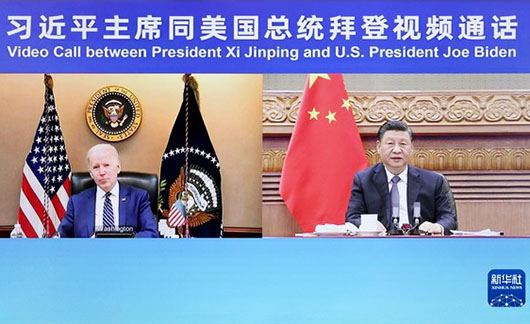FPI / March 23, 2022
By Richard Fisher
The week began on March 13 with the Biden Administration revealing intelligence to major newspapers that Russia had requested significant military and economic assistance from China.

The week ended with a high-drama 1 hour, 50-minute March 18 video call between President Joe Biden and Chinese Communist Party (CCP) supremo Xi Jinping, in which Biden warned Xi about aiding the Russians, but Xi did not indicate what he would do.
One significant tell was the early March 18 mid-flight return to Moscow by Russian Foreign Minister Sergey Lavrov.
Did this mean that China had reversed a previous decision, or simply told the Russians that China would not become a co-antagonist in Russia’s war against Ukraine?
There was no clarity from the official Chinese Foreign Ministry “readout” of the call. There was no clear answer on the critical aid-to-Ukraine question.
It did say all parties “should jointly support Russia-Ukraine dialogue and negotiation and negotiate results and peace. The United States and NATO should also conduct dialogue with Russia to solve the crux of the Ukraine crisis and resolve the security concerns of both Russia and Ukraine.”
However, China’s rhetoric and body language was all about forcing the U.S. to cease its support for Taiwan.
Hours before the Biden-Xi call the People’s Liberation Army Navy sent its aircraft carrier Liaoning to the Taiwan Strait, a rare move usually connected to CCP irritation.
More tartly, on March 18, Global Times quoted Chinese Academy of Sciences member Lu Xiang saying: if it [the U.S.] keeps playing with fire on the Taiwan question and violates China’s core interests, there will be no friendly or positive interactions between China and the U.S.
Lu then alluded to the U.S. having to face a second crisis, perhaps a Chinese invasion of Taiwan, saying, “The Ukraine crisis is already a headache for the U.S. and it will not like more confrontations with China. The U.S. and its politicians should abandon the fantasy that they could solve all problems by imposing sanctions or coercion as it is impossible to solve global problems, including political crises or economic issues without China and Russia.”
But China’s most recent parroting of Russian war propaganda like accusing the U.S. of biowarfare activities with Ukraine, its sharing with Russia of U.S. satellite intelligence showing Russia’s military buildup against Ukraine, its largescale purchases of Russian resources just before the war, on top of a decade of steadily increasing military coordination, if not cooperation, all mean that China is now Russia’s major military ally. …
Full Text . . . . Current Edition . . . . Subscription Information
FPI, Free Press International
